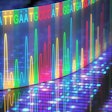
AstraZeneca, Novo Nordisk, Regeneron, and Roche have backed a project to create the largest African ancestry genomics research database.
People of African ancestry are underrepresented in genomics databases, with the U.S. National Institutes of Health (NIH) calculating that they account for less than 2% of genetic information being studied globally today. The underrepresentation leads to clinical genetic testing with less reference data, in turn reducing confidence in the results and hindering efforts to achieve health equity.
Meharry Medical College, a historically Black academic health sciences center in the U.S., partnered with Regeneron Genetics Center (RGC) to create the Together for Change initiative to address that underrepresentation. James E.K. Hildreth Sr., president and CEO of Meharry, discussed the objectives at a launch event for the initiative.
“Together for CHANGE is the first of its kind collaboration between the Black medical community and Big Pharma, dedicated to tackling inequity in drug research and development, tackling it on a massive scale, with a systemic approach to recognizing two things: more research must be done to develop drugs and adopt drug treatments that address the challenges of people of African ancestry; more doors must be opened in the medical and pharma fields to young people of African ancestry,” Hildreth said.
The initiative aims to collect deidentified genomic and phenotypic data from up to 500,000 volunteers, creating what the collaborators say will be the largest African ancestry genomics research database. All samples will undergo whole-exome sequencing, Lyndon Mitnaul, executive director, research initiatives, RGC, said at the launch event. Around 50,000 samples will undergo whole-genome sequencing. An ethics committee featuring leaders from the Black community will oversee the use of the data.
A new nonprofit, the Diaspora Human Genomics Institute (DHGI), will help facilitate the construction of the database as part of its role in the management of the initiative. The DHGI will also set up a program to provide grants for genomics research and education at Meharry, and for broader STEM programs in racially diverse communities for grade school-age children.
RGC, the sequencing wing of the biopharma company Regeneron, helped to bring AstraZeneca, Novo Nordisk, and Roche on board as founding partners of the initiative. Each biopharma company plans to provide $20 million during the initiative. RGC will also fund and perform the sequencing of genetic samples. Hildreth discussed how the initiative will source samples.
“There might be people going to their primary care clinic that will be asked whether or not they choose to participate. If they say, yes, they participate, if they don't want to, we won't coerce them in any way. It's all going to be voluntary. Volunteers who are healthy and well, we want them to volunteer, but also patients who come to see their PCP ... might also be asked to participate,” Hildreth said.



















